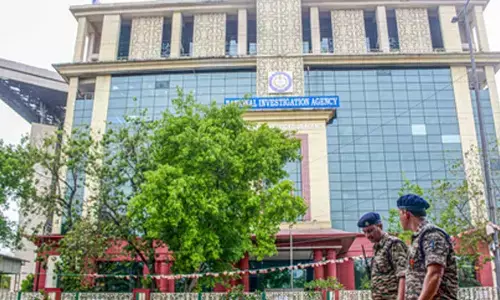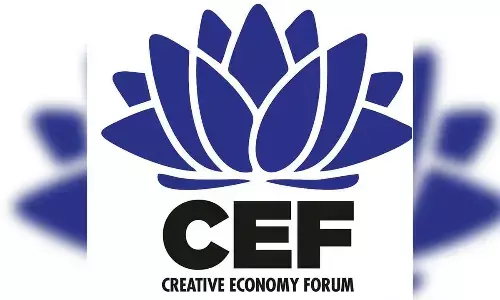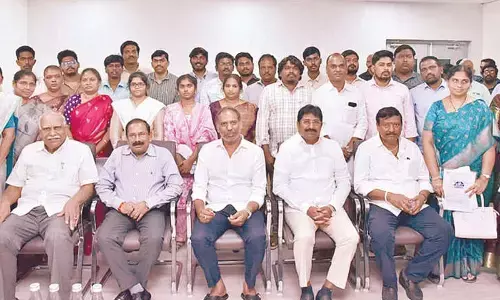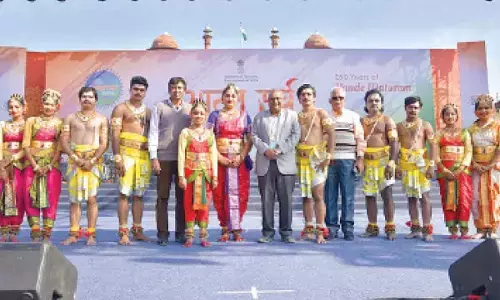MyVoice: Views of our readers 4th December 2022

Views of our readers
Power to root out graft lies in people's hands
Corruption has its deep roots in the history of mankind. But the magnitude of it in the present time surprises one and all. The predatory character it assumes today is a concern occupying the minds of many. In the case of most politicians, the factor that draws them to active politics seems to be the easy way of amassing huge assets in short time.
A person contesting election mentions in the nomination paper the source of his huge income as 'politics.' No doubt, his bold and frank admission deserves appreciation. But it is time the matter is attended to with all its seriousness. Politicians cannot address this as it hits their very livelihood, though it is fashion of every party to speak about eradicating corruption.
Corruption is an inherent character of capitalist order. Therefore, the very economic system needs to be reoriented and the task could be effectively executed only by a mass movement of people led by persons of impeccable integrity.
The ruling dispensation which came to power by assuring to do away with corruption, when the country was plunged in unprecedented episodes of huge magnitude of corruptions, is found to be selectively attending to it with the task of annihilating opposition instead of eliminating corruption. Switching over to a particular party reminds us of the belief 'a dip in Ganges redeems of all sins'. Unless people decide to deal with it, the task will remain a mere political slogan. It is time to act.
– AG Rajmohan, Anantapur
Every year India's position in most corrupt country's table is being scaled up despite the tall claims made by our politicians from the rooftops that they are here to control the corruption in the country.
The corruption originate in our election system. Voters take money to cast votes and the elected leaders in turn earn 100.times for investing huge sums to woo voters. This malady percolates down to employees working in both central and state governments. Every day we read in newspapers that so and so government employee is caught while accepting money to do a favour and that searches yield crores of tainted money and gold and other properties whose value is disproportionate to his known source of income. He will be formally arrested, and then we do not know what happens later. No amount of harsh punishment deters our employees from accepting money. Where does the problem lie?
For the corrupt to thrive in India there is democracy's road well-laid. The approved method is get elected by hook or crook, get into cabinet by any means, get kickbacks at every turn, avoid getting caught. If caught, avoid trial for as long as possible; our judicial system facilitates this, and if tried, avoid a final sentence for as long as possible – our judicial system facilitates this too. If finally sentenced, avoid jail, and if jailed stand for election again and win. Jai Hind! This is the cycle followed by our wise politicians and the laxity in laws is finely exploited by them engaging the best advocates. Although it is impossible to eradicate corruption, if it is contained to a reasonable level, India would surely become one of the economically rich countries in the world. Am I wishing for too much?
– Rama Krishna M, Kakinada
EWS RESERVATIONS: A PIECE IN THE PIE
Reservations have already divided our society vertically. The proposed 10% Reservations for Economically Weaker Sections over and above the existing 50% of Reservations for SCs, STs, and BCs will just be yet another piece in the pie. On the face of it, the move is a good one since there are many poor people in the so called forward castes and they do need some succor from the governments.
Segregating the poor among the forward castes is a big challenge. A person has let out some costly land and house property and the income from this property is enough for his family, but he doesn't pay any tax for his income. Will he or his children be eligible for the EWS Reservations?
When I was in the university hostel during my PG course, many of my friends from forward castes were in the hotels on the basis of EBC condition. In fact, the parents of these students were rich landlords with rural background and without a fixed source of income! Of course, those were the days without PAN and Aadhaar cards which now will play a vital role in finding out the economic status of people.
Again, the Creamy Layer condition has deprived many OBC people of their rightful reservations. Will the governments apply the same norm to the forward castes also? It will be a better programme if the governments allow the EWS reservations to all categories, as opined by the CJ and other experts.
Again the 3:2 split verdict in the EWS case needs a relook. As far as possible the Apex Court must avoid split judgements at least in sensational cases which will overtly or covertly touch and alter items like the Fundamental Rights and the basic structure of the Constitution.
– M Somasekhar Prasad, Hyderabad
Time for national debate on role of Governors
Of late, the conflicts between the Governors and the Chief Ministers of southern States have escalated to a new high. The height of such controversy has assumed a high pitch following the submission of a memorandum to the President by the MPs of Tamil Nadu, demanding ouster of R N Ravi from the gubernatorial post.
Among the five States and a U/T of South India, barring Karnataka and Pondicherry, the remaining four States are ruled by non-BJP or
opposition parties. There has been adverse criticism made against the Governors of these States, except AP.
It is the obligation of the Governor to act as a bridge between the State government and the principles guided under the constitution. Hence the State government cannot at any time defy the Constitution and the rules stipulated by the law. The Governor has a right to plead for review and reconsideration of items sent by the government and he / she is not compelled to sign on the files within a limited time.
Of late, serious complaints have been registered on the functioning of Governors by the CMs of Kerala, Telangana and Tamil Nadu. There have been open conflicts between Governors and CMs of Kerala and Telangana. There have been complaints of phone tapping cases publicly made by Governors including Dr Tamilisai Soundararajan of Telangana which went unheeded by the governments. When the issue of appointing VCs to the State universities has snowballed a controversy in Kerala and TN, a Governor was deprived of his status as the chancellor of state universities, which was unfortunate. People are not permanent, but public and political posts are. This calls for holding a nation-wide discussion on the role of Governors.
– Bh Indu Sekhar, Hyderabad
Vendetta politics
A special court has granted bail to Shiv Sena MP Sanjay Raut, over three months after his arrest in a money laundering case concerning the Patra Chawl redevelopment scam. Sanjay Raut was a main voice of Shiv Sena party. Raut in his article in "Saamna" paper had criticised that the BJP had used the ED to blackmail Sena lawmakers into revolting and effecting a change of government in Maharashtra. Almost all opposition parties have alleged that the government has been using ED to terrorise their leaders. It is said that one of the senior ED officers who investigated opposition leaders on many cases has been given a BJP ticket in UP after his voluntary retirement.
Now a Special Court has granted bail to Raut. It observed that the ED has illegally arrested him in a money laundering case and the action appeared to be like a "Witch hunt." The court has pulled up the Central agency for arresting the politician for no reason and displaying a "pick and choose" attitude. It said that Raut is a victim of political change of power and vendetta politics. The court further said implicating Raut in a false case is nothing but conveying a message and creating a fear psyche in the minds of opposition leaders that they are the next in this queue. It said the allegations are basically nothing but a civil dispute. Granting of bail to Raut and court comments proved that the opposition leaders are facing vendetta politics. It is proved that the Central agencies are acting as pets of Central government.
– Zeeshaan, Kazipet
A vocal critic of govt to turn pro-govt channel
In a recent interview, Gautam Adani had averred that he took over NDTV because he wanted an Indian channel to rival Al Jazeera. If this were truly the case, he could have launched a new channel with his resources
NDTV has for long been a vocal critic of the PM and his party. The government had done its best by targeting the promoter founders. Allegations of economic criminality were made and on one occasion they were prevented from boarding a flight to fly abroad.
It is strange that those who question the neutrality of the channel are silent about the bias of other channels towards the government. The reactions of the fraternity on the resignation of one of their Hindi star reporters shows how far the rot has set in.
The entire drama of the takeover seems like a return gift from the richest man in Asia. The end of NDTV is not just a loss to those who ran it, but something which adversely affects the cause of democracy in India.
– Anthony Henriques, Mumbai
School education in TS wallows in neglect
An eminent professor Elizabeth Warren says "A good education is a foundation for children's better future." The development of a nation is shaped in the classrooms. But the present situation in the government schools of Telangana is worrying. There are no subject teachers in most of the schools. Even the government didn't consider assigning Vidya Volunteers in the schools. Over 15,000 school assistant posts are vacant in high schools. Over 60 per cent of high schools do not have headmasters. Subject teachers are in charge of headmasters. In this case, it has become a great burden to those teachers as they have to teach their subject apart from school administration. There is no supervision over the functioning of schools as over 500 MEO posts are vacant. Besides, dilapidated buildings, lack of laboratories, playgrounds and toilets are some other big drawbacks in providing good education to the students.
Owing to all these, most of the parents are not interested to join their children in government schools. Now the parents are between the devil and the deep blue sea, as they are not ready to send their children to government school and unable to pay big amounts as fee at private schools.
– K Manoj Kumar, Huzurabad
DESTIGMATIZE EPILEPSY
It is widely known that there are roughly 50 million people worldwide who have been diagnosed with epilepsy. It ranks as the fourth most common neurological condition, after Alzheimer's, migraines, and strokes.
More importantly, an estimated 12 million patients live in India. And nearly 60% of Persons with Epilepsy (PWE) have the onset of the disease in their childhood. The good news is that epilepsy is easily manageable if it is properly diagnosed and treated, thus research and public awareness are essential. Despite the fact that epilepsy is treatable, three-quarters of individuals affected in developing countries do not receive the required care. There are over 10 million epileptic seizures in India each year.
According to the Epilepsy Foundation, 1 in 10 people will experience a seizure at some point in their lives, and 1 in 26 people will be diagnosed with epilepsy. Epilepsy, one of the most common neurological disorders, results in aberrant brain activity, which can occasionally result in coma or convulsions or bursts of bizarre behavior or emotions. Seizures are one of the symptoms of epilepsy, however not all seizures are the same. There are factors that increase the chance of someone developing epilepsy, such as: Genetics, Trauma or injury to head,
brain tumor or stroke. Every age group has different issues and worries, and the condition can impact anyone at any time. In addition to medication and surgery, there are other devices that can be used to control, or in some cases eliminate seizures. A wearable medical device that can give an early warning of an epileptic seizure has been developed recently. Modern medicine has all the tools to diagnose, treat and cure epilepsy, but there should be no space for the stigma long attached to the ailment as well. A new gene therapy approach is in development which specifically targets the neurons that cause seizures, preventing them from becoming overactive.
– Dr Krishna Kumar Vepakomma, Hyderabad
According right place to religions
Apropos "The Right to Freedom of Religion not Fundamental Right to Convert," in THI on 29th November. Conversions and anti-conversion movements are always contentious issues across the world. At a fundamental level, the clash is on the meaning of 'freedom of religion.' For some, it means a freedom to convert people into their faith; for others, it implies a freedom from interference from practicing their own beliefs.
The word 'propagate' in Article 25 means the right to convert for the proselytizing religions; for the non-proselytizing Dharmic traditions it means the right to disseminate its good points to others without necessarily trying to convert; conversion does not mean a complete rejection of the 'old' for the 'new.' This is the essence of the clash in India where the Constitution and the courts have differing interpretations of Article 25.
Ironically, Sanatana Dharma lacks all the characteristics that allow us to recognise and differentiates Christianity, Islam, and Judaism as religions: a fixed body of doctrine, an ecclesiastical organization or central authority, a holy book, etc. Hindu, Jain, Sikh, and Buddhist 'traditions' and the 'religions' of Christianity and Islam are phenomena of different kinds. When religion is a matter of doctrinal truth and different religions are rivals, the freedom to convert becomes of the greatest importance. Where religion means the ancestral tradition of a community, like in India, the significance shifts to the freedom to continue one's tradition without aggressive interference from the outside ripping the social fabric. Historically, India has a far better record of pluralism and multiculturalism in mostly peace than Europe and the western world anytime in their histories. We need to rediscover some of the inherent mechanisms in Indian traditions responsible for this. Many scholars have pointed out that 'traditionalised' Islam and Christianity lost their aggressive proselytising drive in India. Similarly, Hindu attempts to impose anti-conversion legislation aggressively also seem to be absent.
The most important step would be to first revise the defining of our Dharmic traditions as 'religions'. The solution then would be in the direction of 'traditionalising our religions' rather than 'religionising our traditions'. The former accepts diversity and leads to peace; and the latter generates intolerance and disharmony. The so-called Hindutva 'fundamentalism' is one of the sad consequences of such understanding of traditions as religions.
– Dr Pingali Gopal, Hanamkonda
















